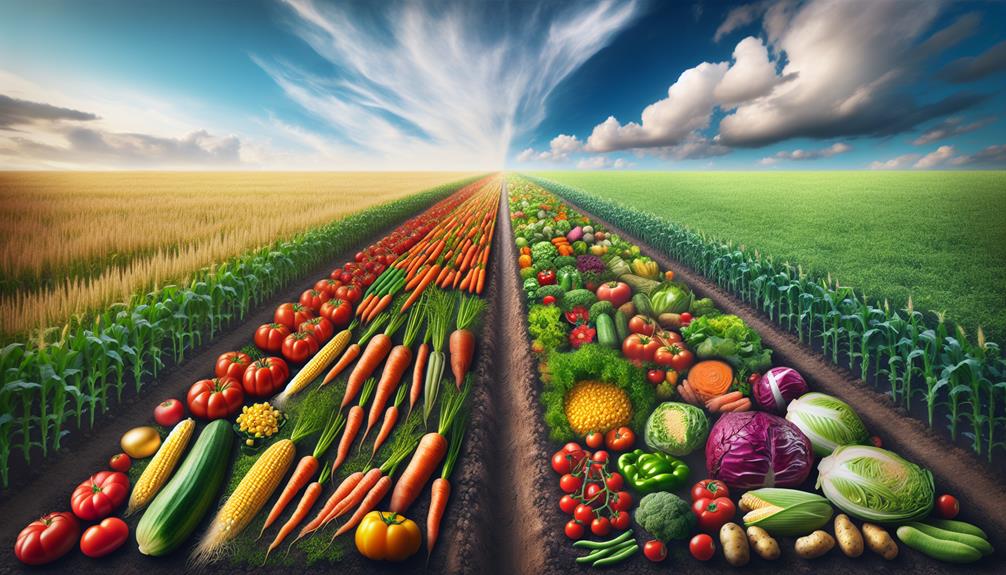You’ve probably heard the debate raging about GMOs and non-GMOs, each side touting its benefits and drawbacks. On one hand, GMOs promise enhanced crop yields and nutritional improvements, potentially easing world hunger in an era of booming populations. Meanwhile, non-GMO advocates highlight the importance of natural agricultural methods and the preservation of biodiversity. Yet, the question remains: which is truly better for our future? Consider the impacts of each on our health, environment, and economy as we explore the subtle nuances that might tip the scales in one direction or another. What side of the debate will you find yourself on?
GMOs
Genetically Modified Organisms, or GMOs, are a pivotal topic in modern agriculture and food production, raising questions about their role in sustainability, health, and environmental impact. Understanding GMOs involves exploring their definitions, benefits, controversies, and implications for food security.
As you delve into this topic, you’ll discover that GMOs present numerous advantages, including enhanced nutritional content and potential ecological benefits. However, these advancements also come with significant controversies that affect public perception and policy.
What Are GMOs?
The term ‘GMO’ might be familiar, yet its implications are often misunderstood. GMOs are defined as genetically modified organisms, which include plants, animals, or microorganisms whose genetic material has been intentionally altered through genetic engineering techniques.
This cutting-edge technology is employed to introduce specific traits to organisms, such as pest resistance, improved resilience to environmental changes, or enhanced nutritional profiles, providing a tailored approach to agricultural challenges.
Definition and Explanation
GMOs are created using sophisticated techniques such as DNA splicing or CRISPR technology, allowing scientists to modify genetic material with precision. This approach not only introduces advantageous traits but also offers a level of control unattainable through traditional breeding methods.
For instance, a study published in Nature Biotechnology highlighted how CRISPR can be used to create crops that are resistant to certain diseases while maintaining their nutritional value, a critical factor in food security.
Benefits of GMOs
GMOs provide numerous benefits that are crucial for modern agriculture. One of the most significant advantages is their ability to enhance crop yields and resistance to adverse conditions.
By genetically modifying plants, researchers can develop varieties that withstand pests, diseases, and extreme weather, ultimately leading to higher production rates. According to the International Service for the Acquisition of Agri-biotech Applications (ISAAA), the global area of biotech crops increased by 1.2 million hectares in 2021, highlighting the growing reliance on GMOs for food production.
Improved Crop Yields and Resistance
Advancements in genetic modification have significantly enhanced agricultural productivity. Here are some key benefits:
- Higher Productivity: Enhanced crop yields per acre, with some GMO varieties achieving increases of up to 30%.
- Less Pesticide Use: Built-in pest resistance reduces reliance on chemical pesticides, leading to improved environmental health.
- Increased Crop Resilience: Crops are developed with better tolerance to drought and extreme weather conditions, critical in regions facing climate change.
- Economic Efficiency: Lower production costs and increased supply stability benefit farmers economically.
Case studies, such as the adoption of Bt cotton in India, have shown that farmers experienced a 40% increase in income due to reduced pesticide costs and higher yields.
Nutritional Enhancements
GMOs have the potential to improve the nutritional content of food significantly. By fortifying crops with essential vitamins and minerals, genetically modified organisms can address global dietary deficiencies.
For example, ‘Golden Rice‘ has been engineered to produce beta-carotene, crucial in preventing vitamin A deficiency, which affects millions of children in developing countries. In fact, according to the World Health Organization, vitamin A deficiency is a leading cause of preventable blindness in children.
Moreover, innovations like iron-enriched crops aim to combat anemia, significantly impacting women’s and children’s health in low-income regions. Research indicates that these GMO advancements can lead to a measurable decrease in iron deficiency.
In contrast, traditional breeding methods can take years to achieve similar results, making genetic engineering a vital tool for rapid nutritional enhancement.
Controversies Surrounding GMOs
While the benefits of GMOs are substantial, the controversies surrounding them cannot be overlooked. These discussions often focus on health concerns raised by researchers and consumer groups.
Critics argue that GMOs may pose risks to human health, citing studies that suggest possible links to allergies and other health issues. A 2020 report from the European Food Safety Authority (EFSA) reiterated the need for ongoing assessments of GMO safety, highlighting the importance of a balanced analysis.
Proponents of GMOs, however, cite extensive research indicating that GMOs are as safe as their non-GMO counterparts. The American Medical Association has stated that there is no scientific evidence to support claims that GMOs pose a greater risk than conventional foods, emphasizing the need for informed consumer choices.
Health Concerns
The health concerns associated with GMOs have sparked significant debate. Here are some of the main issues:
- Allergenicity: The potential introduction of new allergens into the food supply raises concerns.
- Gene Transfer: The risk of modified genes transferring to body cells or gut bacteria remains a topic of discussion.
- Antibiotic Resistance: Some engineered genes may confer antibiotic resistance, prompting further investigation.
- Nutritional Changes: Alterations in the nutrient profiles of GMO crops are under scrutiny, necessitating comprehensive research.
To address these concerns, ongoing research and transparent communication are vital for building public trust.
Environmental Impact
Several studies indicate that GMOs can significantly reduce the use of chemical pesticides and herbicides, which has a positive impact on environmental health. By modifying the genetic make-up of crops to enhance their resistance to pests and diseases, farmers are less reliant on synthetic chemicals, thereby contributing to lower pollution levels in water bodies.
Furthermore, GMO crops often require fewer tillage operations, which helps minimize soil erosion and promotes better soil health. Healthier soils sustain diverse microbial communities, crucial for maintaining ecosystem balance. Research published in Soil Biology and Biochemistry suggests that healthier soils can play a significant role in carbon sequestration, potentially helping mitigate climate change effects.
Nevertheless, the long-term ecological impacts of GMOs remain an area of active research. While the immediate benefits are clear, concerns about gene transfer between modified and wild plants could disrupt local ecosystems. As a consumer, staying informed about ongoing research and developments in GMO technology is essential for making environmentally responsible choices.
In conclusion, GMOs represent a complex intersection of science, health, and environment that requires careful consideration from all stakeholders involved in the agricultural sector.
Legislation on GMOs
As you explore the landscape of GMO regulations, you’ll find that current laws vary widely by country, reflecting diverse approaches to safety, trade, and public health concerns.
The debates on labeling laws are particularly contentious, as stakeholders argue over transparency versus the potential for misleading consumers.
Meanwhile, industry perspectives often focus on the potential benefits of GMOs, such as increased yields and resistance to pests, while also maneuvering through the regulatory environments that can affect product development and market access.
Current Regulations
Countries around the world have implemented varied legislation concerning the cultivation, distribution, and labeling of genetically modified organisms (GMOs). You’ll find that these regulations often reflect the unique environmental, economic, and social priorities of each nation.
Here’s a closer look at how some countries regulate GMOs:
- European Union (EU): The EU maintains a strict regulatory framework for GMOs. Any GMO must be authorized before it can be cultivated or marketed within the EU. The approval process involves a detailed assessment of potential impacts on human and animal health and the environment.
- United States: The U.S. adopts a more product-based approach. GMOs are regulated by the USDA, EPA, and FDA, each responsible for different aspects of GMO safety and distribution. The focus is on the characteristics of the end product rather than the process of genetic modification itself.
- Brazil: Brazil is a major producer of GMO crops, mainly soybeans and corn. The approval process is managed by the National Technical Commission on Biosafety, which evaluates both commercial and environmental aspects.
- India: In India, GMO cultivation is subject to approval by the Genetic Engineering Appraisal Committee. The country currently allows the cultivation of GMO cotton while imposing stringent regulations on the trial and commercialization of other GMO crops.
This array of approaches shows that while the science of GMOs is global, the policies regarding them are tailored to local needs and concerns.
Debates on Labeling Laws
You may wonder why the debate over GMO labeling laws is so vigorous.
Proponents argue that you have the right to know what’s in your food, suggesting that labels on GMO products are necessary for informed consumer choices.
Opponents, however, claim that such labeling could unjustly stigmatize genetically modified foods, which research shows are as safe as their non-GMO counterparts.
Consumer Right to Know
Debates about GMO labeling laws have heated up as consumers demand transparency about the foods they eat.
Here’s what you need to take into account:
- Health Concerns: Understanding potential allergens or health effects.
- Environmental Impact: Evaluating ecological implications.
- Ethical Considerations: Reflecting on the morality of genetic modifications.
- Economic Effects: Examining how labeling might influence market prices and consumer choices.
Make sure you’re informed about what’s on your plate.
Industry Perspectives
Legislation on GMOs greatly influences industry strategies and responses, as governments establish regulations that directly affect agricultural production and market access. You’ve seen that these laws vary considerably between countries, impacting how companies operate globally.
For instance, the European Union has stringent GMO regulations, requiring rigorous safety assessments and labeling before market entry. This contrasts with the United States, where GMOs are more widely accepted and regulations focus on the product rather than the process of genetic modification.
As an industry stakeholder, you’re aware that these legislative frameworks can either open doors or erect barriers. In regions with strict GMO laws, companies might need to invest heavily in compliance or opt to focus on non-GMO products to ease market penetration.
Conversely, in countries with more lenient regulations, firms might capitalize on the cost-efficiency and enhanced productivity that GMOs offer.
The balance you must strike between adhering to legislative requirements and leveraging market opportunities is delicate. Staying informed and agile is critical, as regulations can evolve. Engaging in ongoing dialogue with regulatory bodies and participating in industry associations can help you navigate this complex landscape.
Understanding and adapting to these legal nuances is essential for maintaining competitive advantage and ensuring sustainable business practices.
Recent Studies and Findings
You’ll find that recent research on GMOs is extensive and multifaceted, exploring both potential benefits and risks.
Public perception and awareness vary greatly, influenced strongly by media coverage that often highlights controversies surrounding GMO use.
It’s important to examine how these elements interplay to shape policies and consumer choices.
Scientific Research on GMOs
Recent studies on GMOs have consistently shown that genetically modified crops can contribute greatly to sustainable agriculture by enhancing crop yield and resistance to pests and diseases. These crops can be engineered to thrive under harsh conditions such as drought or poor soil quality, making them invaluable in parts of the world where traditional agriculture struggles.
Here are some key findings from recent research:
- Increased Nutritional Value: Some GMO crops have been developed with increased levels of essential nutrients, such as vitamins and minerals, which can combat malnutrition.
- Reduced Environmental Impact: GMOs often require fewer pesticide applications. For instance, Bt corn naturally resists pest attacks, reducing the need for chemical pesticides.
- Economic Benefits: Farmers growing GMO crops have often reported higher profits due to improved yields and reduced costs on pesticides and herbicides.
- Adaptation to Climate Change: GMOs are being designed to better withstand the stresses caused by global warming, including increased temperatures and altered rainfall patterns.
These developments suggest that GMOs could play an important role in addressing future food security and environmental challenges. However, ongoing research and careful oversight are essential to make sure that the benefits are realized while minimizing potential risks.
Public Perception and Awareness
Recent studies have shown that your awareness of GMOs greatly influences your shopping habits. You’re more likely to choose non-GMO products if you perceive them as healthier or environmentally friendly.
However, this choice can also be swayed by the availability and price differences between GMO and non-GMO products.
Impact on Consumer Choices
Many consumers are increasingly aware of GMO products, influencing their purchasing decisions based on the latest research findings.
- Health concerns: Growing studies link GMOs to health issues, swaying buyer choices.
- Environmental impact: Awareness of GMOs’ ecological effects guides consumer behavior.
- Label transparency: Shoppers seek clear labeling, choosing products based on GMO content.
- Ethical considerations: Ethical debates over GMO practices affect purchasing decisions.
Media Coverage
Media coverage has often shaped public opinion on GMOs by highlighting the latest research findings and studies. As you explore these reports, it’s important to grasp how various media outlets may present differing aspects of scientific research, impacting your perception of GMOs.
Recent studies, for instance, might be framed in a light that either supports or criticizes GMO practices, depending on the media’s perspective or potential biases.
It’s essential to ponder the source of the information you encounter. Major scientific journals and reputable news sources usually provide a more balanced view, incorporating insights from multiple experts in the field. However, you’ll find that some articles might selectively omit data or fail to report on the full spectrum of scientific findings, leading to a skewed understanding of GMOs.
You should also be mindful of the timing and context in which these studies are reported. Media may emphasize certain studies during heated policy debates or legislative sessions on agricultural practices, which can amplify specific viewpoints or downplay others.
Future of GMOs
As you contemplate the future of GMOs, it’s important to recognize how technological advancements could reshape agricultural practices.
You’ll also need to weigh the ethical considerations that accompany these developments.
Evaluating both will help you understand the complex trajectory of GMOs in the coming years.
Technological Advancements
When thinking about the future of GMOs, we must acknowledge that technological advancements are poised to revolutionize how we engineer crops and livestock. As you explore further into the subject, it’s important to understand the specific technologies shaping this transformation. These innovations not only aim to enhance yield and resilience but also seek to address the growing environmental and health concerns associated with traditional agricultural practices.
Here are four key technologies to watch:
- CRISPR-Cas9 Gene Editing: This tool allows for precise alterations in the DNA of plants and animals, enabling the development of crops with desirable traits such as drought resistance or enhanced nutritional content.
- Synthetic Biology: By designing and synthesizing DNA, scientists can create entirely new biological systems in plants and animals, potentially introducing features that don’t naturally occur.
- AI and Machine Learning: These technologies help in predicting the outcomes of genetic modifications, optimizing breeding strategies, and managing agricultural data more efficiently.
- Vertical Farming: While not a genetic technology per se, vertical farming uses controlled environments to maximize yield and can be integrated with GMOs for the most efficient resource use.
As these technologies advance, they promise to enhance the sustainability and efficiency of food production globally.
Ethical Considerations
As you contemplate the future of GMOs, it’s essential to assess how they impact global food security. Research shows that GMO crops can potentially increase food production and nutritional content, addressing hunger in vulnerable populations.
However, you must also weigh potential risks and ethical concerns, such as biodiversity loss and corporate control over seeds.
Global Food Security Issues
GMOs play a pivotal role in addressing global food security challenges. Yet, they raise significant ethical questions that require careful examination.
Here are key points to ponder:
- Ownership and Control: Who owns GMO technology?
- Biodiversity: Does GMO cultivation affect genetic diversity?
- Access and Equity: Who gets access to GMO benefits?
- Long-term Effects: What’re the long-term ecological impacts?
These aspects are critical in shaping the future of food security.




